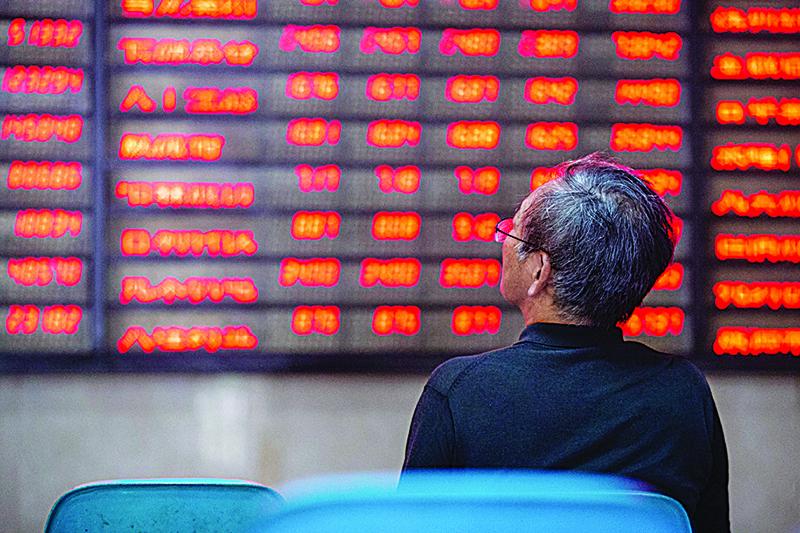
LONDON: World shares were approaching a five-month peak and the dollar slipped yesterday as investors wagered the earnings season would see most companies beat forecasts given expectations had been lowered by coronavirus lockdowns. The US earnings season kicks off this week with major Wall Street banks JPMorgan, Citigroup and Wells Fargo reporting on Tuesday. It’s expected to be the second-biggest quarterly earnings drop since 1968, according to Refinitiv data.
“There’s a view that the bar has been set pretty low for them to report the almost obligatory ‘better than expected’ results - the absence of forward guidance from many firms notwithstanding,” said Ray Attrill, head of FX strategy at NAB.
European shares rose yesterday, with cyclical sectors leading gains as investors hoped the upcoming earnings season and stimulus talks will feed into an economic recovery from the coronavirus-induced downturn. The pan-European STOXX index rose 0.5 percent, with miners gaining 1.7 percent on optimism over China’s recovery and surging metal prices. Other growth-oriented sectors such as travel & leisure , banks, automakers and oil & gas rose between 0.6 percent and 1.2 percent. Global investor sentiment also brightened at the start of a week that kicks off the US and European quarterly earnings season and includes a summit over the European Union recovery fund and a European Central Bank policy meeting.
“There appears to be some optimism that forecasts have been lowered to such an extent that businesses will be able to clear this low bar and surpass expectations,” AJ Bell Investment Director Russ Mould said. Companies listed on the STOXX 600 are expected to report a 54 percent drop in second-quarter profit, the worst ever reading for Europe, according to Refinitiv data.
While the ECB is not expected to make a major move, European leaders will meet on July 17-18 to hammer out details on the $750 billion euro recovery fund, a key factor for euro zone stocks. “Our economists are optimistic that an agreement on the European Recovery Fund can be reached, though it is touch and go whether this can happen in time for the summit,” analysts at RBC wrote in a morning note. Financial markets have taken comfort from trillions of dollars in stimulus and progress in the development of a COVID-19 treatment even as the World Health Organization reported a record increase in global coronavirus cases on Sunday.
In company news, Finnish valves maker Neles surged 36.5 percent to hit a record high after Swedish industrial group Alfa Laval announced a recommended 1.73 billion euro ($1.96 billion) cash bid. Nordic bank DNB rose 9.2 percent and Nordic Semiconductor gained 9.0 percent following better-than-expected earnings reports.
Norwegian blue-chips jumped 1.6 percent in their biggest one-day percentage gain in nearly a month. Swedish hygiene products group Essity was flat after reporting a marginal rise in second-quarter core earnings, as the initial bulk-buying of products eased as countries emerged from the lockdown.
French video games group Ubisoft fell 7.2 percent as it announced staff departures after a review in response to allegations of misconduct at the company.
MSCI’s broadest index of Asia-Pacific shares outside Japan added 0.8 percent as Chinese stocks jumped 2.1 percent yesterday. Japan’s Nikkei gained 2.2 percent and South Korea 1.7 percent. The optimism carried over to Europe, where stocks rose 1 percent, even as the US on Friday slapped additional duties of 25 percent on French luxury goods valued at $1.3 billion, in a tit-for-tat response to France’s digital services tax. MSCI’s All-Country World Index was just shy of hitting Feb. 26 highs. E-Mini futures for the S&P 500 ticked 0.5 percent higher despite record new cases of COVID-19 in the US over the weekend, a divergence that shows no sign of stopping.
“Ongoing grim US COVID-19 infection news continues to be summarily ignored in favor of ongoing optimism regarding the time-line for the discovery and rapid roll-out of an effective vaccine and/or more policy support for asset prices and the US economy,” Attrill said. The risk-on rally saw the US dollar dip 0.2 percent against a basket of major currencies after three straight weeks of losses. The euro, meanwhile, rose 0.2 percent to $1.132 to maintain its slow uptrend since late last month. Looming large for the common currency was a planned EU summit on July 17-18, where leaders need to bridge gaps on long-term budget and economic stimulus plans.
Oil prices eased in early trade, although that followed a sharp rise on Friday when the International Energy Agency (IEA) bumped up its 2020 demand forecast. Brent crude futures dipped 49 cents to $42.75 a barrel, while US crude lost 52 cents to $40.03. —Reuters
.jpg)



